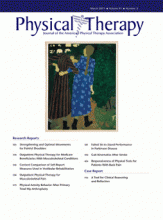<LEAP> highlights the findings and application of Cochrane reviews and other evidence pertinent to the practice of physical therapy. The Cochrane Library is a respected source of reliable evidence related to health care. Cochrane systematic reviews explore the evidence for and against the effectiveness and appropriateness of interventions—medications, surgery, education, nutrition, exercise—and the evidence for and against the use of diagnostic tests for specific conditions. Cochrane reviews are designed to facilitate the decisions of clinicians, patients, and others in health care by providing a careful review and interpretation of research studies published in the scientific literature.1 Each article in this PTJ series summarizes a Cochrane review or other scientific evidence on a single topic and presents clinical scenarios based on real patients or programs to illustrate how the results of the review can be used to directly inform clinical decisions. This article focuses on an older patient with fatigue and dypsnea following treatment for lung cancer. Could an exercise regimen help reduce her cancer-related fatigue?
Cancer-related fatigue reportedly affects 70% to 100% of people with cancer.2 The fatigue can occur during treatment or after treatment is completed. It has been reported to result in restrictions in activity and participation in life events.3 The cause of cancer-related fatigue is largely unknown,4 although factors contributing to it have been suggested.5–7 Guidelines for managing cancer-related fatigue, published by the National Comprehensive Cancer Network, suggest first treating any identifiable conditions—for example, anemia or insomnia.8 If these treatments do not work, or if no potentially causative factor can …












